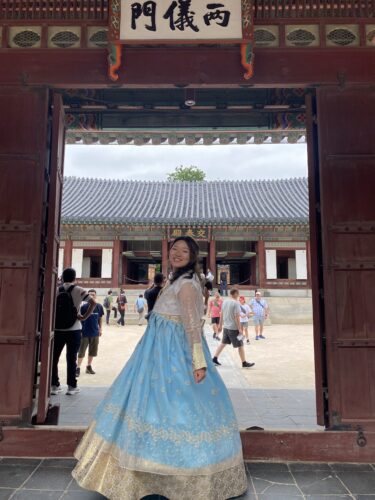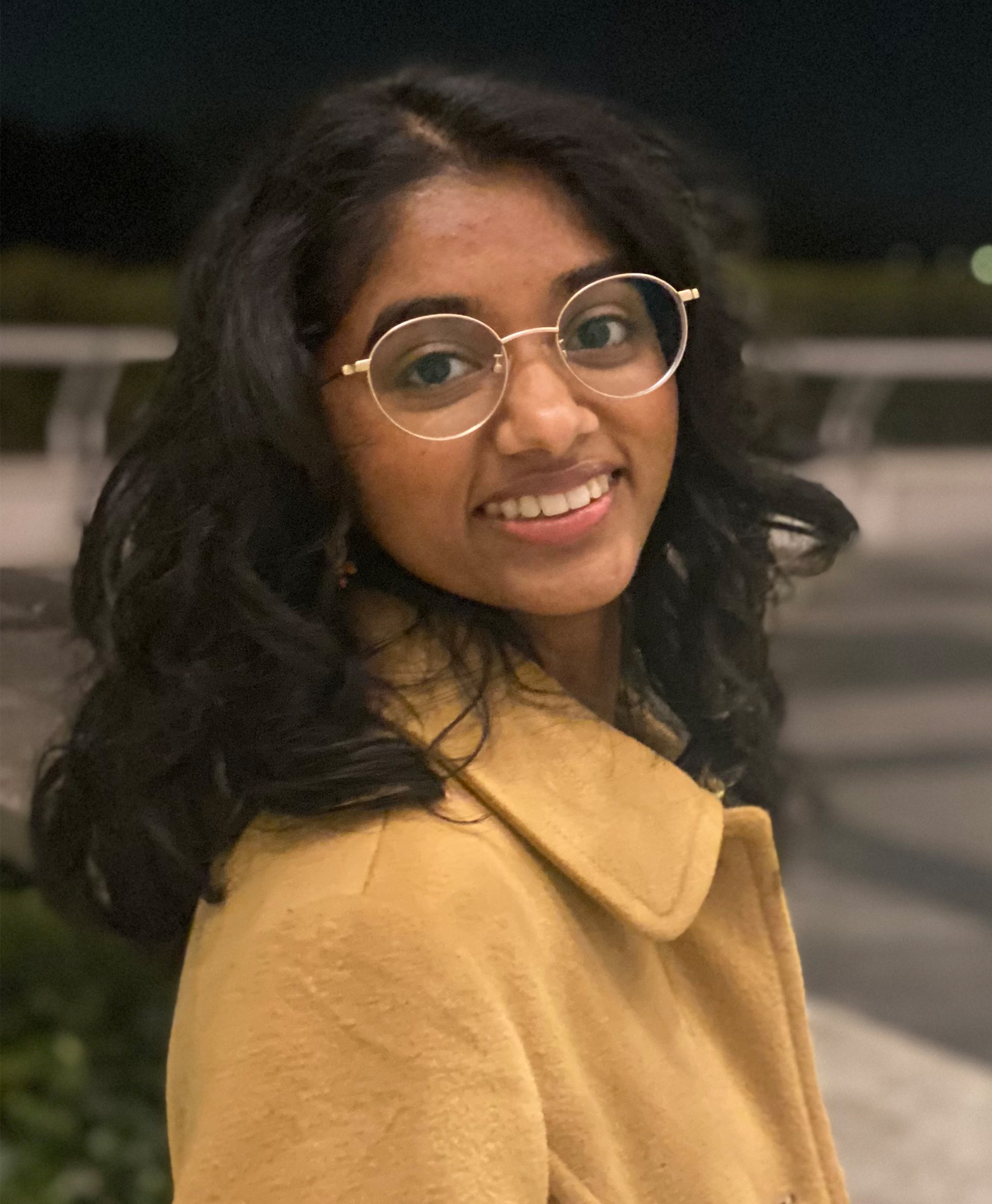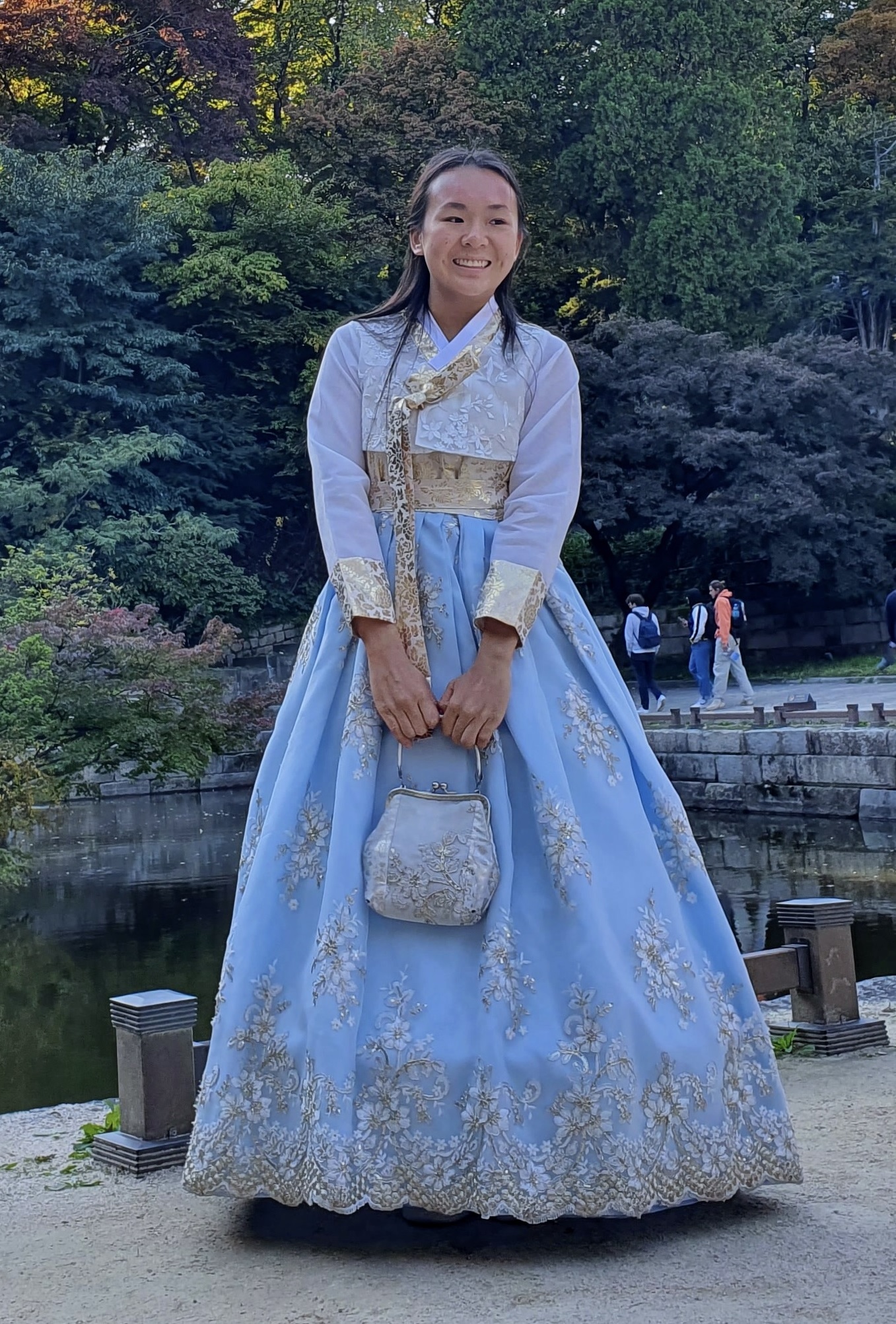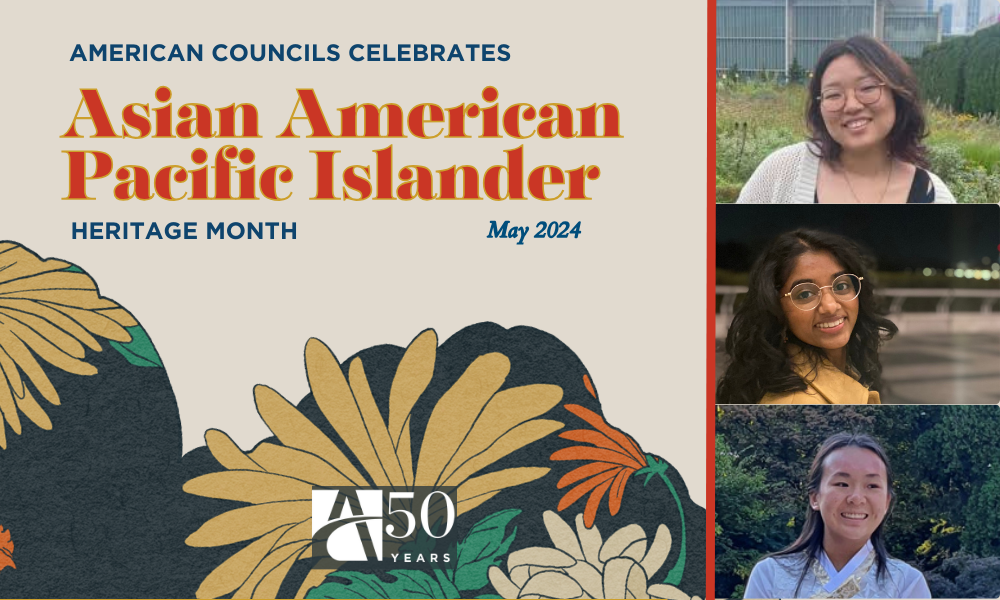Asian American Pacific Islander Heritage Month is an annual celebration observed to honor the culture, traditions, and history of Asian American and Pacific Islander communities in the United States. Throughout May, American Councils dedicates special attention to celebrating Asian American Pacific Islander (AAPI) Heritage Month, spotlighting the experiences, perspectives, and contributions of AAPI individuals in the realm of international education.
According to the 2023 Open Doors data report on international exchange, 10% of U.S. students studying abroad during 2020-2021 identified as Asian, Native Hawaiian, or another Pacific Islander. American Councils recognizes the importance of amplifying the voices and experiences of these students during their international endeavors. We take pride in showcasing how the identities of AAPI participants, coupled with their cross-cultural encounters overseas, have molded their professional and personal growth.
Our commitment extends beyond May, as we continue to share narratives and accomplishments from students and alumni underrepresented in study abroad throughout the year. Each month presents an opportunity to acknowledge and celebrate the diversity within our participant community.
This year, American Councils staff spoke with National Security Language Initiative for Youth (NSLI-Y) program alumni about their heritage, identity, and language-learning journeys while studying abroad.
Sarah Kim
 Sarah Kim, a NSLI-Y alumna from Phoenix, Arizona, participated in the 2023 Korean Summer program. She is pursuing a double major in Industrial Engineering and International Studies as a first-year student at Northwestern University.
Sarah Kim, a NSLI-Y alumna from Phoenix, Arizona, participated in the 2023 Korean Summer program. She is pursuing a double major in Industrial Engineering and International Studies as a first-year student at Northwestern University.
Growing up in a Korean-American household, Sarah experienced the influence of the "Korean wave" during her middle school years, characterized by the rising popularity of K-pop and Korean culture in the United States. Witnessing a friend's interest in learning Korean spurred Sarah to confront feelings of cultural disconnection, prompting her to pursue Korean language lessons.
“I was unable to read in the language of my heritage while my non-Korean friends could,” Sarah reflected. “This motivated me to seek out Korean lessons.”
Sarah commenced her Korean language journey in 2020, first attending Sunday school classes at a Korean church until the COVID-19 pandemic. Living with her Korean-speaking grandmother during the COVID-19 lockdown motivated Sarah to hone her language skills further. After months of self-study, Sarah stumbled upon the NSLI-Y program and decided to apply.
The news of her acceptance into the program, with a placement in Seoul, South Korea, filled Sarah with immense joy as it marked her inaugural visit to her family’s ancestral homeland—a journey unprecedented in her family since their immigration to the U.S. in the 1990s. Sarah was also excited to experience life in a country where she wouldn’t be a minority. “I would finally be surrounded by people who looked like me, which isn’t something that I was privy to from growing up in my predominantly white community.”
Despite her initial excitement, Sarah encountered challenges in Seoul, struggling to communicate with locals who presumed her fluency in Korean. Nevertheless, she embraced these hurdles as opportunities for linguistic growth and cultural immersion.
“While I still made mistakes in my conversations, it was a great opportunity to be pushed to speak in Korean instead of reverting to what I deemed comfortable.”
As a heritage language learner, Sarah carried her familial linguistic heritage with her, grappling with dialectical disparities between her upbringing and the Korean spoken in Seoul. Despite these challenges, Sarah navigated her time in Seoul with resilience, enhancing her Korean proficiency while delving into Korean history and culture. Visits to landmarks like Gyeongbokung Palace and donning traditional hanbok attire provided Sarah with profound insights into her identity as a Korean-American.
“It was highly valuable for my personal growth to learn more about the culture of my heritage, and I would recommend that other students put in the effort to do the same.”
Continuing her Korean studies through the Critical Language Scholarship (CLS) Program this summer, Sarah encourages fellow heritage language learners to embrace the intricacies of their identities to enrich their study abroad experiences. She advises students to acknowledge and embrace the nuanced aspects of their identity while abroad.
Aparna Bhooshanan
 Aparna Bhooshanan is an alumnus of the 2019 NSLI-Y Summer Chinese program in Xi’an, China. Aparna is studying Chinese and Computer Science at the University of Alabama.
Aparna Bhooshanan is an alumnus of the 2019 NSLI-Y Summer Chinese program in Xi’an, China. Aparna is studying Chinese and Computer Science at the University of Alabama.
Aparna was inspired to participate in NSLI-Y by her older sister Meenu and acknowledges that she owes a lot of her experiences and success to her family. When her sister returned from a Summer NSLI-Y program in Jordan, she would speak to her family in Arabic, even sometimes teasing Aparna in Arabic. Witnessing the impact the experience had on her sister, Aparna sought a language she could love just as much as Meenu loved Arabic. By chance, Aparna found her passion for Chinese.
Aparna appreciates the life-changing impact that studying abroad had on her identity, so much so that she categorizes her life into pre- and post-NSLI-Y periods. Learning Chinese in an immersive setting and her experiences in Xi’an changed her perspective on her own heritage and culture. Growing up, Aparna learned about the stereotyped division between South Asian and East Asian people. She often was confronted by the assumption that Indians were not Asian. After completing NSLI-Y, she realized how similar South Asian and East Asian cultures are, making her confident to proudly claim ‘Asian’ as part of her identity.
Returning from study abroad, Aparna felt motivated to continue Chinese. However, her high school did not offer Chinese class. Aparna therefore began volunteering with ESL classes and improved her communication skills by speaking with Chinese immigrants in her town.
Aparna recently received the Critical Language Scholarship to study Chinese this summer, along with a Boren Scholarship for an academic year of Chinese study in Taiwan. Aparna is excited to learn more about perspectives in Taiwan and different language variants. She hopes that she will be able to use the perspectives she gains to “be able to create software in multicultural contexts that is sensitive to the areas that it will be used in.”
Angela Li
 Angela Li's journey with language and cultural immersion began with her participation in the 2020 Virtual Summer Intensive Korean program, followed by her involvement in the 2021 Summer and 2022-2023 Academic Year Korean programs. Currently pursuing a dual degree in Computer Science and Political Science at the University of Florida, Angela is not just a student but also an active NSLI-Y Alumni Representative for the Southeast region of the United States The opportunities to interact with peers in different cultural and linguistic environments through study abroad has reinforced Angela’s desire to work in an international environment. She hopes to work in the intersection of technology and politics and is hoping to join the Foreign Service as a diplomat.
Angela Li's journey with language and cultural immersion began with her participation in the 2020 Virtual Summer Intensive Korean program, followed by her involvement in the 2021 Summer and 2022-2023 Academic Year Korean programs. Currently pursuing a dual degree in Computer Science and Political Science at the University of Florida, Angela is not just a student but also an active NSLI-Y Alumni Representative for the Southeast region of the United States The opportunities to interact with peers in different cultural and linguistic environments through study abroad has reinforced Angela’s desire to work in an international environment. She hopes to work in the intersection of technology and politics and is hoping to join the Foreign Service as a diplomat.
Angela was inspired to study abroad by her older sister’s stories about gaining international friendships and new experiences while studying abroad in college. She believes that NSLI-Y was the perfect opportunity for her as it removed the financial barrier of study abroad and provided a chance to intensively study a language as a high school student.
Angela notes that studying Korean helped her understand her role as a global citizen and connect with her Asian heritage. “While Korean culture is different from the Chinese culture of my heritage, comparing the similarities and differences between them gave me a deeper understanding of both,” Angela shared.
It wasn't the grand adventures or iconic landmarks that left the most lasting impression on Angela during her time abroad. Rather, it was the seemingly ordinary moments that etched themselves into her memory—the candid conversations about politics over dinner with her host parents, the bustling morning commutes to the subway station accompanied by the rhythm of her favorite music, the late-night Uno matches with her host siblings, and the shared laughter over language mishaps.
Angela credits the NSLI-Y program for fostering her personal growth. “I learned how to be flexible, open-minded, and adventurous,” Angela shared. I became more focused on living in the moment, finding joy and excitement in the small, mundane moments. I gained confidence in my ability to not only live, but thrive abroad."
As she continues to navigate her path forward, Angela remains grateful for the invaluable lessons learned and the connections forged through her immersion in Korean culture.
About the National Security Language Initiative for Youth (NSLI-Y) Program
The National Security Language Initiative for Youth (NSLI-Y), a program of the U.S. Department of State's Educational and Affairs, provides critical language study opportunities to American youth through merit-based scholarships to spark a lifetime interest in critical foreign languages and cultures. Scholarships are available for students to study Arabic, Indonesian, Chinese (Mandarin), Hindi, Korean, Persian (Tajiki), Russian, and Turkish. Visit the NSLI-Y website for further detail.
About the Critical Language Scholarship Program (CLS)
The U.S. Department of State's Critical Language Scholarship (CLS) Program is a funded summer language program for American undergraduate and graduate students. The Critical Language Scholarship (CLS) Program is an immersive summer opportunity for American college and university students to learn languages essential to America's engagement with the world. Each summer, the CLS Program administers intensive study abroad institutes in over a dozen critical languages around the world. The CLS Program, through its CLS Spark initiative, provides beginner-level virtual instruction for Arabic, Chinese and Russian. The CLS Program is administered by American Councils for International Education.

